Key takeaways:
- The importance of awareness and preparedness in understanding homeland security threats, as personal experiences highlight the need to recognize vulnerabilities.
- Resilience is crucial for effective recovery from disruptions, emphasizing collective action and community support rather than just individual strength.
- Building strong relationships and equipping oneself with knowledge enhance resilience, enabling confident responses to emergencies.
- Regularly evaluating and adapting resilience plans, alongside gathering feedback from a support network, ensures ongoing effectiveness in response strategies.
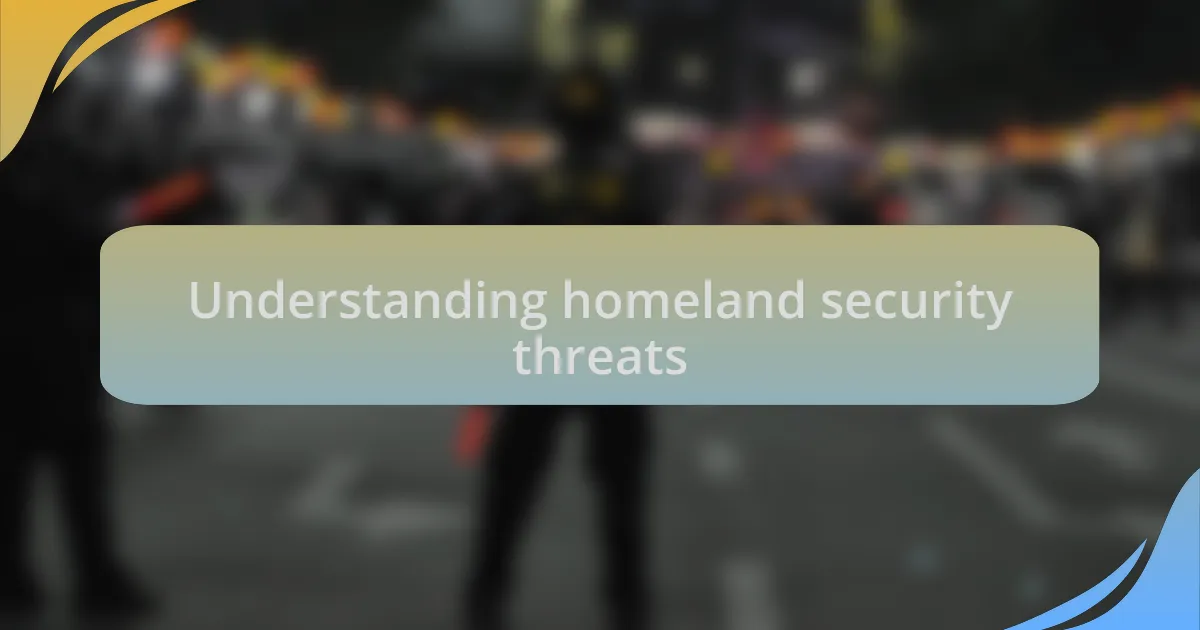
Understanding homeland security threats
Homeland security threats come in various forms, from cyberattacks to natural disasters. Reflecting on my own experiences, I once found myself in a small town during a severe storm that disrupted communication and resources. It made me realize how unprepared we can be for unexpected threats, emphasizing the importance of understanding these risks in advance.
Consider how everyday citizens perceive threats—often, there’s a sense of detachment. I’ve spoken with friends who brush aside cybersecurity threats, thinking, “It won’t happen to me.” But when I shared stories of identity theft affecting people close to them, a shift occurred. This proved how critical it is for everyone to recognize the potential impact of threats that may seem distant or unlikely.
The core of homeland security lies in awareness and preparedness. I distinctly remember attending a community workshop on disaster response, where the facilitators stressed the importance of knowing our vulnerabilities. Listening to personal accounts of those who faced evacuations or emergency situations, I grasped that understanding these threats isn’t just an academic exercise; it’s a vital step towards safeguarding ourselves and our communities.
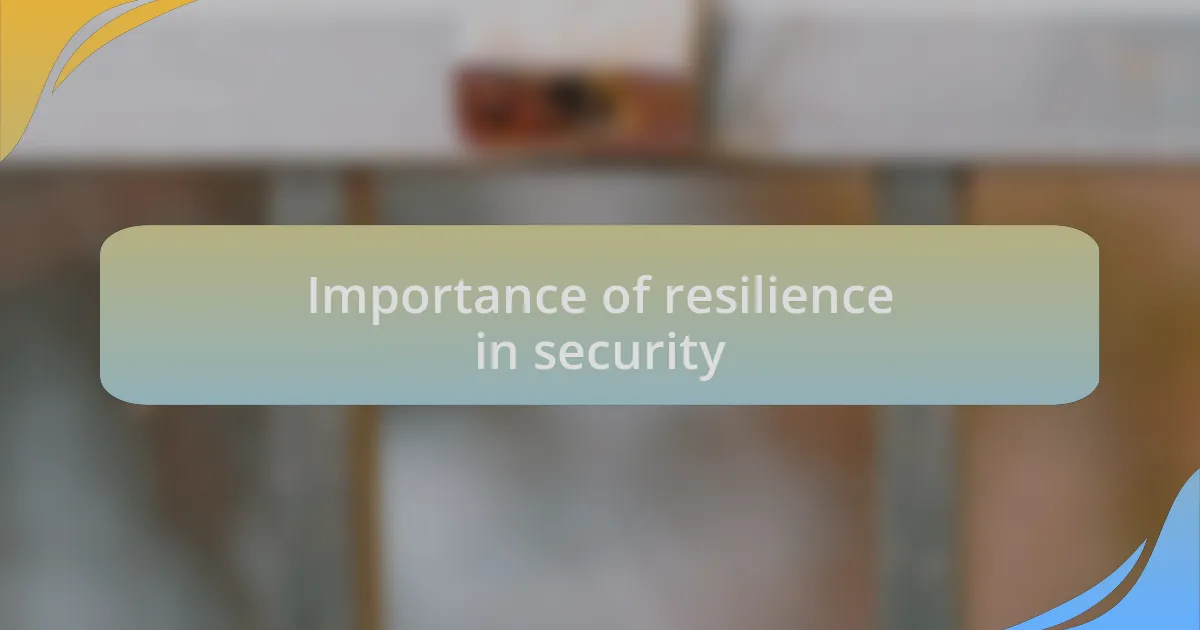
Importance of resilience in security
Resilience in security is essential because it determines how effectively we can withstand and recover from disruptions. I remember a time when my neighborhood faced a sudden power outage due to an unexpected storm. While some residents panicked, others with emergency plans quickly banded together, sharing resources and information. This experience highlighted how preparedness fosters community cohesion, reinforcing the idea that resilience is not just about individual strength but also about collective action.
When evaluating security measures, it’s critical to consider resilience as a core value. Last year, I attended a seminar on cybersecurity, where the speaker emphasized that attacks are inevitable, but a resilient infrastructure can minimize their impact. It struck me that viewing resilience as an integral part of our security strategy enables us to adapt and learn from challenges, ultimately evolving our defenses against future threats.
Moreover, resilience cultivates a mindset of proactive vigilance. I was once involved in a neighborhood watch initiative, and what surprised me most was the heightened awareness it brought among residents. We began discussing not just individual safety but also how to support one another in times of crisis. I came to realize that this shared responsibility fosters a culture of resilience, vital for our overall security, allowing us to face whatever threats may arise.
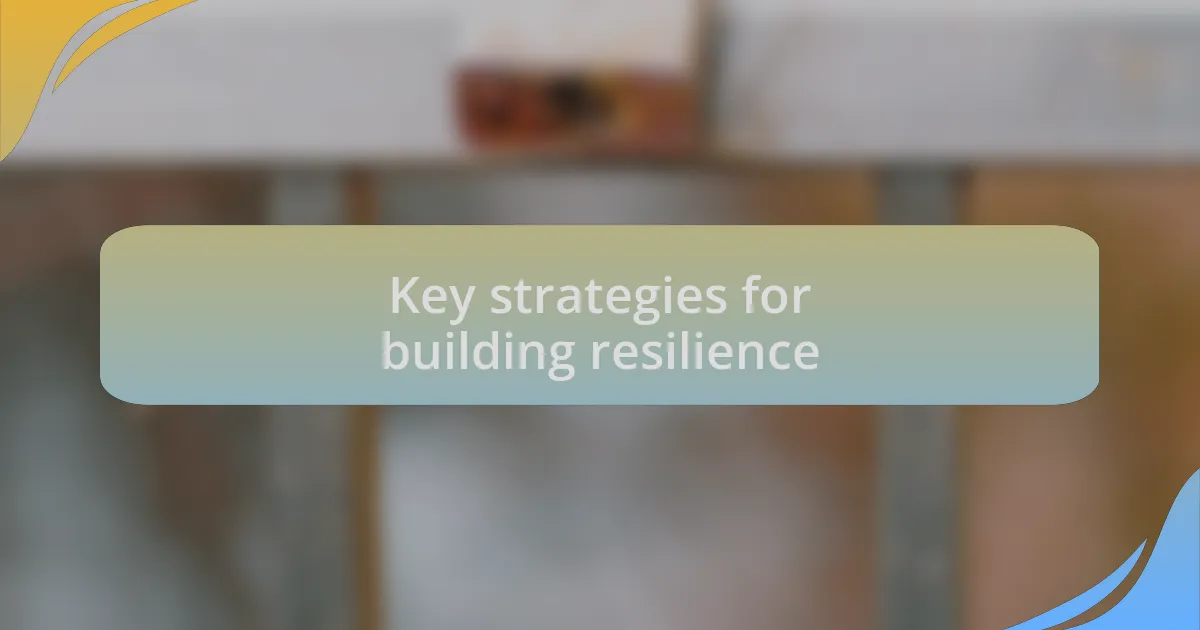
Key strategies for building resilience
Building resilience often starts with fostering strong relationships within our communities. I vividly remember a town meeting after a natural disaster, where everyone shared their experiences and concerns. This open dialogue not only strengthened bonds but also inspired productive collaboration, illuminating how collective action can enhance our ability to bounce back from setbacks.
Equipping ourselves with the right knowledge and skills is another crucial factor in building resilience. When I took a first aid course, I realized that the training went beyond just medical skills; it empowered me to act confidently in emergencies. How many times have you wished you could do something meaningful in a crisis? Knowledge solidifies our resilience, allowing us to take decisive actions instead of feeling helpless.
Lastly, it’s important to maintain a flexible mindset when faced with adversity. During a particularly challenging time in my professional life, adapting to new circumstances became paramount. I learned that resilience isn’t strictly about enduring hardships; it’s about embracing change and finding innovative solutions. Have you considered how your mindset influences your ability to recover from setbacks? Embracing flexibility can transform potential threats into opportunities for growth.

Practical steps to enhance readiness
When it comes to practical steps to enhance readiness, developing a personal emergency plan is essential. I recall sitting down one evening and drafting a simple plan with my family. We discussed escape routes, meeting points, and vital contact information. This exercise not only calmed my nerves but also generated a sense of empowerment among us. Have you taken the time to create a similar plan? It’s surprising how much peace of mind a little preparation can provide.
Regular training and drills within the community can significantly boost collective readiness. Participating in community drills gave me a firsthand look at how everyone’s roles are vital during an emergency. It was reassuring to see families coming together, practicing evacuation routes, and honing their communication strategies. Shouldn’t we all take part in such proactive measures? Engaging in these exercises not only sharpens skills but builds an unbreakable sense of fellowship and preparedness.
Finally, staying informed about potential threats in your area can’t be overstated. I remember subscribing to local alerts after a series of alarming weather events nearby. Keeping up with updates allowed me to plan ahead and make informed decisions quickly. How often do you check for local advisories? Being proactive in understanding potential risks strengthens not only your readiness but also that of your community, as knowledge truly is power.
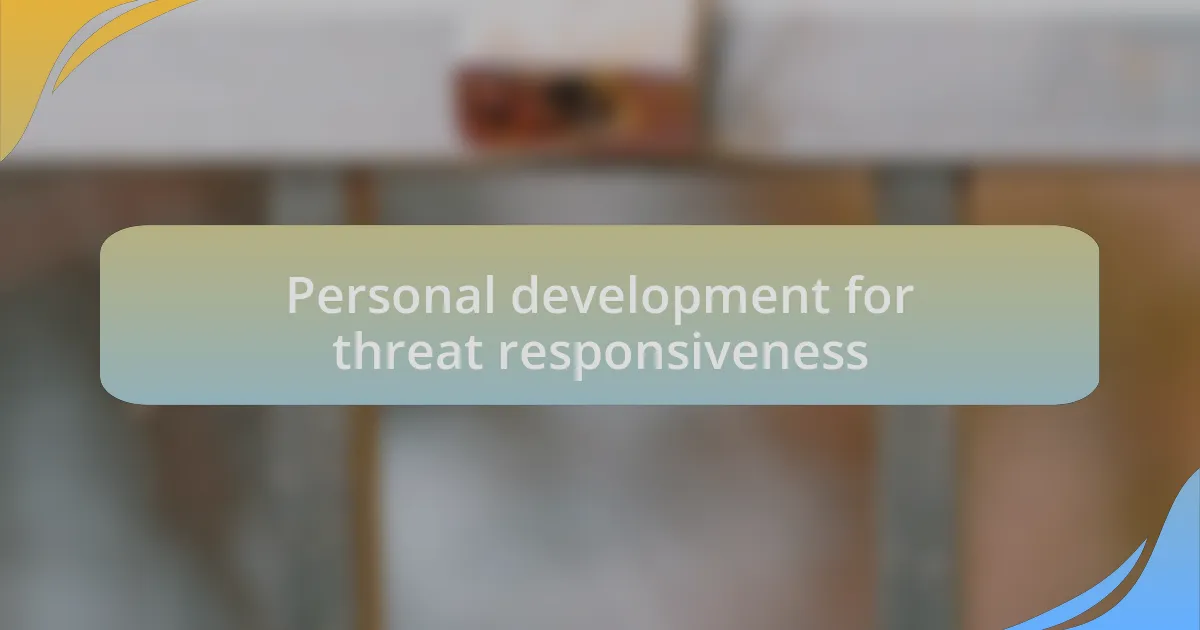
Personal development for threat responsiveness
Building personal resilience against threats begins with a commitment to self-improvement and awareness. I remember when I first took a self-defense class, feeling a mix of apprehension and curiosity. Not only did I learn valuable skills, but the experience also empowered me with the confidence to respond effectively in potentially dangerous situations. Have you considered what skills might benefit your own readiness?
Mindfulness practices can play a crucial role in enhancing our preparedness as well. I’ve found that dedicating a few minutes each day to meditation helps me remain calm and focused when faced with stressors. This clarity has been invaluable during emergency scenarios, allowing me to assess situations rationally instead of panicking. What routines can you incorporate into your life to foster a resilient mindset?
Another key aspect of personal development is building supportive relationships. Reflecting on my experience, I realized how vital it is to have a network of trusted friends and family who can provide support during crisis situations. Sharing concerns and strategies with them not only strengthens those bonds but also creates a safety net that can make all the difference when urgency strikes. Isn’t it comforting to know that you’re not alone in navigating potential threats?
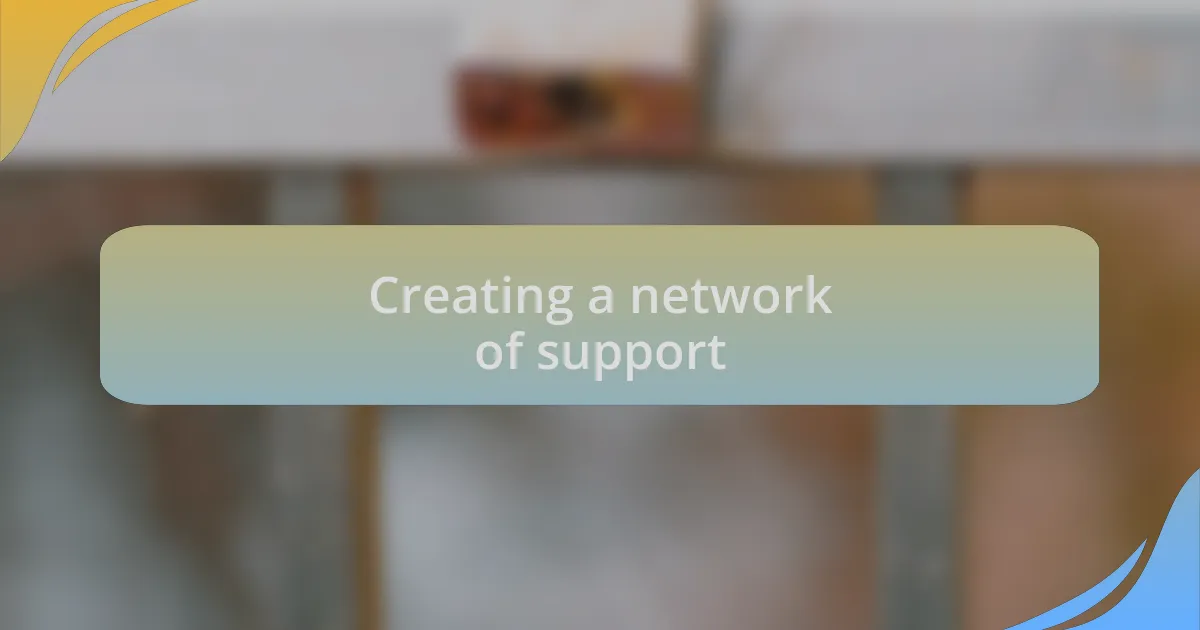
Creating a network of support
Developing a strong network of support has been a game-changer for me. I recall a time when I felt overwhelmed by a series of stressful events; it was my friends who quickly stepped in, offering not just a listening ear but also practical advice based on their own experiences. Have you considered who in your life could step up when you need support? That sense of community made all the difference in my ability to cope and rebound.
It’s fascinating how sharing experiences with others can cultivate resilience. I often meet with a group of colleagues to discuss our challenges and strategies for dealing with stress. During one of these gatherings, a colleague shared a personal story about facing an unexpected crisis, reminding us all that vulnerability can be a source of strength. In what ways can you open up about your own challenges to develop deeper connections with those around you?
Moreover, I’ve learned that cultivating diverse relationships enriches my support network. Having friends from various backgrounds allows me to benefit from different perspectives when facing threats. I remember seeking advice from a friend who grew up in a different cultural environment—her insights were incredibly enlightening and helped me rethink my approach to certain situations. Have you thought about how varying viewpoints might aid your resilience?
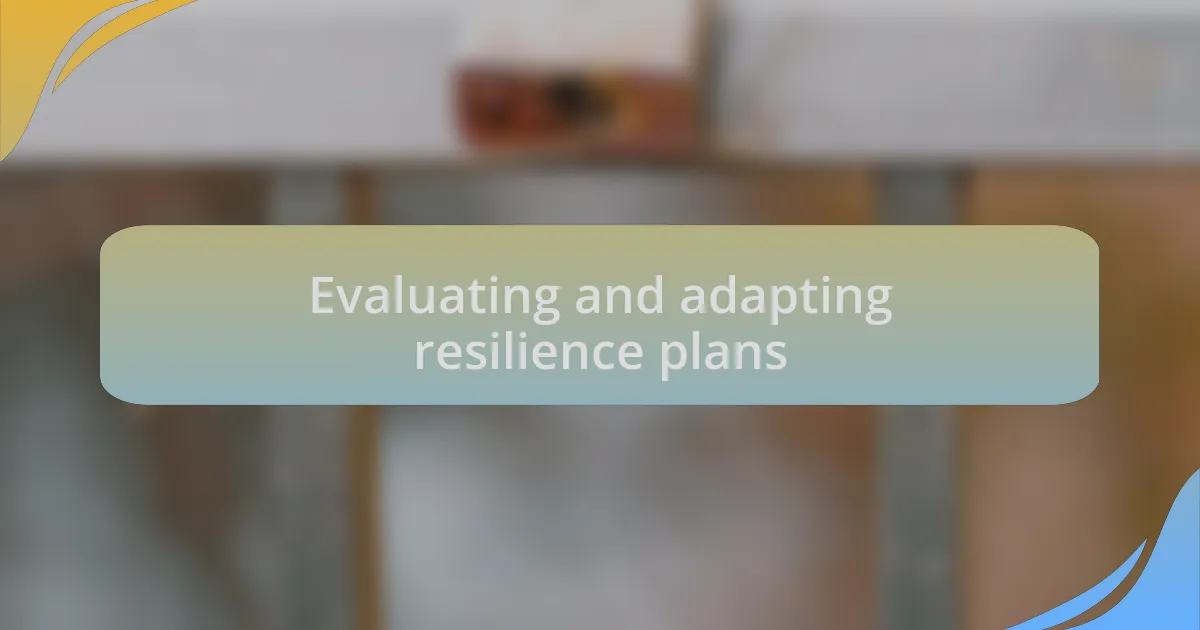
Evaluating and adapting resilience plans
Evaluating and adapting resilience plans is essential for staying effective in an ever-changing landscape. I remember reviewing my own plans after experiencing a significant disruption; it became clear that what had once worked might not apply again. Have you ever thought about how often you reassess your strategies for resilience?
In my experience, gathering feedback from those in my support network has proven invaluable. By discussing my resilience strategies with friends and colleagues, I often uncover blind spots I hadn’t considered. How do you incorporate input from others into your planning? This collaborative approach not only strengthens my plans but also fosters a sense of shared ownership and commitment.
Adapting resilience plans requires a keen understanding of what’s working and what might need revision. During a recent workshop, we evaluated our responses to a simulated threat, and I was surprised to find that certain strategies didn’t resonate as much as I expected. This experience made me realize how vital it is to remain adaptable and open to change. Are you ready to embrace the possibility of evolving your plan based on real-time insights?